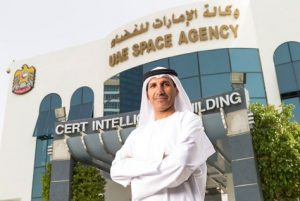
The United Arab Emirates Space Agency convened the first two-day conference of the Emirates Space Innovation Group (ESIG) on 3-4 May 2016, with the group creating a science and technology roadmap.
The ESIG has been established to develop the science, technology and innovation capabilities in the UAE space sector and to coordinate projects being undertaken by stakeholders across the space sector, including government entities, corporate elements, universities, and research facilities.
The aim of the ESIG is to maximize UAE national space-faring capabilities, with the ultimate objective to further improve the UAE’s space sector involvement in and collaboration with future projects funded by the UAE Space Agency.
As well as the development of a science and technology roadmap, the ESIG established a survey to help determine UAE space sector capability needs in accordance with the evolving strategic context and to identify research and development opportunities.
H.E. Khalifa Mohamed Al Romaithi, Chairman of the UAE Space Agency, said: “ESIG is the manifestation of our strategic vision and core values, as well as being aligned with the UAE Vision 2021 and contributing to further economic diversification. Firstly, ESIG will consolidate our national space-faring and research capabilities, ensuring that the UAE takes its place at the forefront of the space sector — both regionally and internationally. Secondly, by working with universities, satellite operators and industry we are developing our practical commitments to the next generation and contributing to the human potential of the UAE.”
“Furthermore, by successfully conquering the unknown throughout our space exploration missions and research programmes, we are contributing to the pride our citizens feel for the UAE as a rapidly-developing space-faring nation.” Al Romaithi added.
The ESIG is led by a steering committee that meets twice a year, and is chaired by the Director General of the UAE Space Agency, H.E. Dr. Mohammed Al Ahbabi. The ESIG steering committee directs the main ESIG body, chaired by the Director of Space Missions Management, Khaled Al Hashmi, and includes all member bodies from universities, satellite operators, and industry and meets on a quarterly basis. Out of this structure are three coordination task forces responsible for space science, technology, and exploration.
At the ESIG conference workshop sessions included proposals for involvement in space missions and projects, including the design and manufacture of CubeSats and microsatellites for the operational plan 2017-2021. Some of the organisations present include the Masdar Institute, Khalifa University, Sharjah Center for Astronomy & Space Sciences, Strata, Tawazun Precision Industries, Thuraya, and YahSat.
Dr. Al Ahbabi, Director General of the UAE Space Agency, said: “We strive to incorporate a diverse range of creativity and ingenuity so that we can remain as innovative as possible. Participants on Thursday’s session submitted proposals on a range of topics, including commercially viable space capabilities, deep space research, earth science research, and transformational space technologies.”
“We believe that the space sector as a whole is greater than the sum of its parts,” added Dr. Al Ahbabi. “As such, this first workshop has proven to be an exciting opportunity that succeeded in bringing together some of the best minds in the country — all of whom were joined together under the common vision of space exploration and research.”
This first ESIG meeting establishes the UAE Space Agency as the hub of all space sector activities in the UAE, coordinating the activities of other UAE government departments, private companies, universities, and research institutes.
Professor Lakmal Seneviratne of Khalifa University Robotics Institute said: “I really appreciated the networking opportunities between universities and industry today. I think there’s a great opportunity going forward to create a space ecosystem in the UAE. With the Space Agency playing a coordinating role, I think the future looks bright for space in the UAE.”
Dr. Hamdi Sheibani, Chair of Mechanical Engineering at Abu Dhabi University, added: “We are planning to establish specific programmes, such as aerospace programmes, so that local and foreign students can contribute to UAE Space Agency missions.”
The ESIG meeting also discussed the importance of promoting and sustaining science, technology, engineering, and mathematics (STEM) education for young Emiratis so that they will be encouraged to seek careers in the UAE space sector when they graduate.
 SpaceWatch.Global An independent perspective on space
SpaceWatch.Global An independent perspective on space

